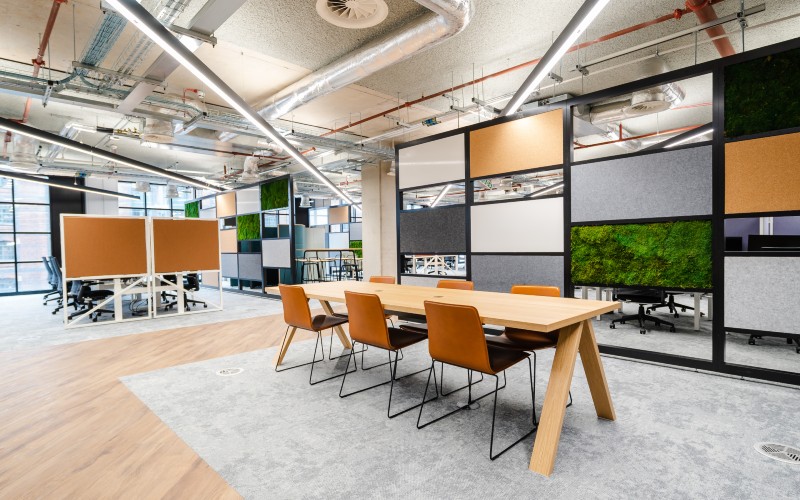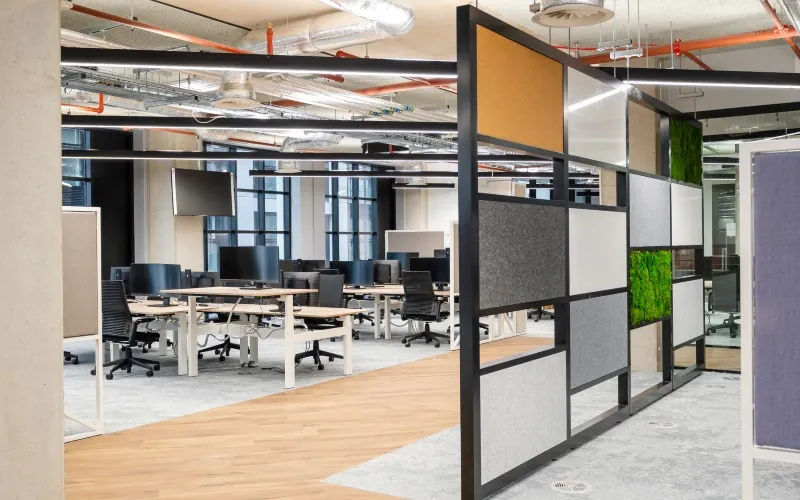PropTech
Picture your first office: did it have blue carpets, white walls and meeting rooms behind glass?
If so, you’re not alone.
“That’s how it was when we started OBI,” says Will Lewis, director of the Manchester-based property consultancy which he co-founded in 2010. “If you had 100 people in the business, you’d take 10,000 square feet: you had meeting rooms, a kitchen, a reception area, and maybe a manager’s office.
“The world has changed so much since then in terms of the levels of sophistication companies need from their workspaces: how are their people going to work? How do they want their premises to look and feel?
“That’s probably the most exciting part of our business now.”
Changing tastes
OBI works with a dazzling array of Manchester’s fastest-growing technology businesses to deliver their property needs in all areas – from identifying their requirements to securing space, designing the fit-out and project-managing the transition from existing offices.
“Rather than looking at space per person, we now work with our clients to figure out how many people they want per desk. The ratio has changed: there might be 1.6 members of staff per desk in their main workspace,” Lewis tells BusinessCloud. “Are they agile working? Are they hybrid working?
“Even if everyone is in the office, not many businesses have more than 80% of their desks occupied at any one time because of meetings, external appointments, or travel.
“People are way more interested now in how much space they actually need. They might have 100 people, but they might only want 3,000-4,000 sq ft, which is 30-40% of what businesses would take previously.
“You have to embrace it; just because people aren’t taking as much space, that isn’t a bad thing. And they need more help now than ever before because they can’t just downsize: they need to change the way they work.”
Enter technology
Naturally technology is at the center of this revolution. OBI recently delivered the new fit-out of Booking.com’s UK tech hub at Manchester Goods Yard in Enterprise City, a four-year project bringing the company’s 2,000-strong team in Manchester – including 300 new roles created this year – under one roof. OBI undertook the search and acquisition role for the new premises in 2018.
The company’s second largest global hub outside Amsterdam, OBI was appointed to provide workplace consultancy, interior design, project management, contract administration and cost consultancy services for the new workspace, which covers approximately 175,000 sq ft of space set over five floors.
The design includes fully connected meeting spaces, team rooms, breakout spaces, catering facilities, ‘zen’ spaces, conference auditorium facilities with a seminar event space for 250 people, games rooms and external winter gardens on each floor.

Smart office monitoring systems have also been incorporated into the project. This will help Booking.com understand how many people are in each space enabling smart technology to monitor and adjust environments to suit the social environment in the office.
“Every area of a building had one use previously. Now, if there’s a meeting room, it might be used for clients; as a Zoom Room; and an internal collaboration room,” explains Lewis.
“Companies need to get the right technology integrated into their workspace. It really frees up – or limits – how flexible your space is.”
AO
OBI’s interior design division, now integral to its offering, came into existence at the request of high-profile and long-time client AO.com.
“We had the procurement piece and implementation of the fit-out. But our client said: ‘It’s a real shame that you don’t do the workplace consultancy and interior design,’” acknowledges Lewis. “So we started a division to also design our client’s spaces.
“No other surveying firm has that: it always gets outsourced. It’s a big USP to our service offering.”
OBI works closely with clients – known as ‘occupiers’ in the industry – to research their needs, conducting surveys and workshops, before it begins to look around for potential sites.
“The workplace team gets involved right at the outset now, whereas three years ago we’d find a building and pass it to them to start their work,” says Lewis.

The COVID-19 pandemic brought about a decade of change in the commercial property sector in under two years, he adds. “During COVID, we helped clients when they were at their most vulnerable. Doing that, and being there at the end of the phone, builds relationships for the next 10 years.
“We just kept learning throughout COVID. It made us get to know each client better because there isn’t any consistency at all, even sector by sector, in how people work: take any two tech firms and they will be poles apart in terms of their approach to the office and working strategies.”
Tech stars
OBI has many clients in financial and professional services, but has cornered the market for scaling tech firms in the Manchester area: it counts CarFinance 247, Zuto, The Hut Group, musicMagpie, Peak and Connex One among its clients, working with some of them almost since inception.
“We’ve got a great black book, but our work now really is generated from recommendations. It is quite a tight community and, if you do a good job, one of these CEOs, CFOs, COOs or Heads of Talent will tell their friends – everyone moves in the same circles.
“So doing a good job and having that long-term client relationship also pays off in terms of generating further business.”
While its landlord development work is concentrated in Manchester or large nearby schemes such as MediaCity and Alderley Park, it secures space for occupiers all over the country – and even further afield. “We’ve done work in Germany; we did an acquisition for Booking.com in Barcelona,” says Lewis.
PropTech 50 – UK’s most innovative property technology creators for 2022
From playground to entrepreneur
The Stoke City season ticket holder “flogged T-shirts” at school.
“I made a brand, ‘Radvanced’ – radical and advanced – but that didn’t work. I only sold about 50!” he laughs. “I sold knocked-off clobber at university, fake Stone Island stuff and trainers. I worked for Mars at university, merchandising products into the student union and local shops.
“I always wanted a job where I wasn’t tied to a desk and I could meet people. The good thing about working with occupiers, as opposed to landlords, is that you meet all these people like Andy Bell (AJ Bell), John Roberts (AO), Matt Molding (THG), Ged Mason (Morson) – and even Peter Coates (Bet365) and Fred Done (Betfred), who we have also done business with.
“You get to meet people from all different walks of life. There are the corporate people, CEOs of big listed companies, but these self-made entrepreneurs are interesting people to work with… challenging, sometimes, but you learn a lot!
“I think that desire [to meet people] actually pushed me to go down the occupier side as opposed to just servicing landlords with lettings and investments.”
Lewis is also passionate about charity work and helping young people: OBI supports The Manchester Youth Zone in Harpurhey and Foundation 92 in Salford. He is on the board of the latter, set up by former Manchester United stars in the ‘Class of 92’.
“I’ve also got a cricket app business called Cricket Allrounder with Chris Gayle and Jimmy Anderson,” he reveals. “It’s a coaching app to encourage participation at grassroots level globally, which we’re launching soon.”
.